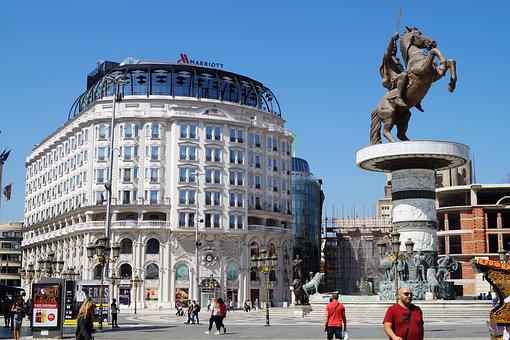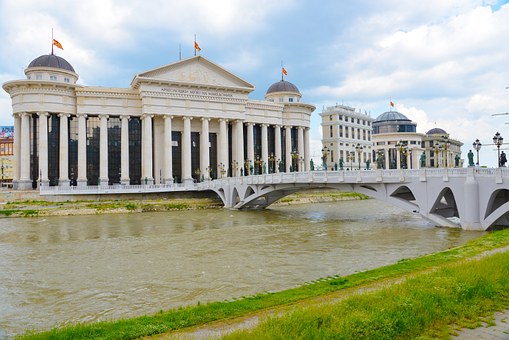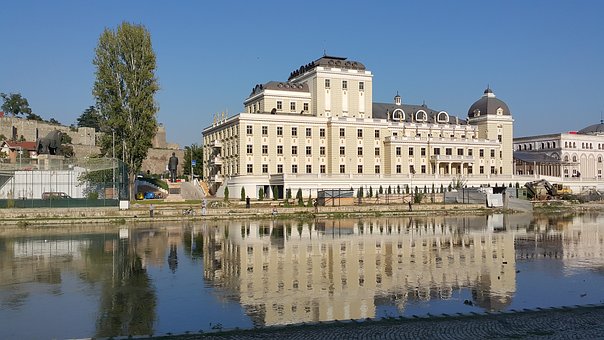 The
Republic of Macedonia now has a young and dynamic leadership which has
succeeded in transforming Macedonia's image both domestically and abroad.
According to repeated polls, for the first time in two decades, people
are optimistic and investors sanguine.
The
Republic of Macedonia now has a young and dynamic leadership which has
succeeded in transforming Macedonia's image both domestically and abroad.
According to repeated polls, for the first time in two decades, people
are optimistic and investors sanguine.
But there are troubling currents
afoot. Macedonia is undergoing a worrisome change of character. If not
reversed, these malignant processes will backfire and Macedonia's hopes
will be cruelly dashed. Under Nikola Gruevski, Macedonia, for the first
time, stands a chance of becoming a prosperous member of Europe and the
international community. Its history of self-destructive self-defeating
behavior can be avoided.
Macedonians would do well
to learn from the experience of the countries of Central Asia and the Caucasus
described in the following article.

All the countries in the
mutilated post-Communist parts of Europe inevitably ended up poor. Yet,
as opposed to their neighbors, some polities failed to alleviate their
misery or ameliorate their dire predicament. The denizens of these states
are not only impoverished - they also feel like losers and failures.
To avoid confronting such
unpalatable truths and to fend off a tormenting self-image, the citizenry
of these places developed a host of psychological defense mechanisms.
 1.
Magical Thinking
1.
Magical Thinking
The belief in a fantastic
world in which miracles occur, saviors materialize, one is immune to the
consequences of one's inaction, and all ends well, regardless of current
realities.
The leaders of such countries
provide their voters with fairy tales and grandiose fantasies about multi-billion
dollar investments, which typically never materialize.

Worse still, this obsessive
preoccupation with deus-ex-machina salvation-by-outsiders detracts from
and distracts the scarce human resources at the disposal of the government.
As a result, the authorities
neglect to tackle the most pressing problems facing their nation: unemployment,
dysfunctional institutions, and venality. In the meantime, asset bubbles
- both in real estate and in the bloated and much-manipulated stock exchange
- imperil the country's financial system.
2. Messianic-Religious
Leadership
From the Caucasus to the
republics of former Yugoslavia, leaders of economically decrepit countries
in the region present themselves as either Messiah-like saviors or martyrs
to the cause, hounded by a "hate-filled and jealous" opposition, or victimized
by outside forces. Such leaders ostentatiously "dedicate themselves" to
the nation, forsaking a private life or worldly pleasures.
Their subjects crave for
honest and hard-working leadership and so hungrily succumb to the allure
of ceaseless media campaigns, which border on a personality cult. They
suspend their disbelief and dispense with rationality. The Dear Leader
becomes the focal point of their hopes and dreams while other institutions
- parliament, the judiciary, and the media - shrink and wither.
Often, this populist worship
results in an authoritarian regime that gradually, almost imperceptibly
replaces consensus politics. The Beloved Leader keeps paying lip service
to democracy and functioning institutions, but effectively, he contemptuously
ignores them. He purges the civil service, staffing it with cronies and
relatives, and he treats the opposition as traitors and enemies of the
state.

3. Denial of Reality
From the Caucasus, through
Central Asia, to the Balkans and Africa, unable to face the dismal condition
of their countries, people choose to simply deny it. Hype and spin and
public relations replace real action and substantive reforms.
The language itself is subverted:
corruption is redefined by the powers that be to exclude blatant nepotism;
a mere change of ownership hailed as a revolutionizing foreign investment;
promises and plans presented as facts (faits accompli); statistical methodology
altered to produce favorable results. Thus, reality is done away with and
replaced with fantasy.
4. Aggressive Assertiveness
Rather than accept the fact
that the nation's low self-esteem and lack of self-confidence are outcomes
of its failures, the leadership reverses cause and effects: the country's
repeated failures are now, officially, a RESULT of people's wavering self-esteem
and self-confidence. People who doubt the leadership's claims and doctored
data "don't believe in the future of the nation, don't believe that (insert
the name of the country) can (succeed)." Dissidents are, therefore, branded
as pusillanimous traitors.
Thus, everyone is encouraged
to adopt a loathsome variant of newfound assertiveness that borders on
narcissism and is unpleasantly aggressive. It does not reflect an inner
conviction in the real capabilities and skills of the populace. It is merely
demonstrative and hyperbolic.
Top



